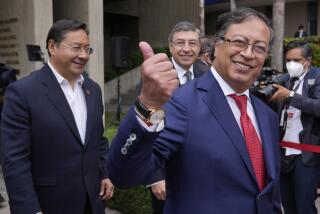Free-press group urges Cuba to act
- Share via
GUANTANAMO BAY, CUBA — The free-press advocacy group Reporters Without Borders appealed Friday to Cuban leader Raul Castro to free 19 journalists still jailed in Cuba five years after a crackdown on critics of the regime.
The international group, which is banned from visiting the Communist-ruled island in any journalistic capacity, sent an undercover reporter to assess the climate for free speech under the recently changed leadership.
Fidel Castro, Raul’s brother, stepped down from the presidency last month after 49 years of rule.
Though the media watchdogs continue to decry strict limits on journalists outside the state’s closely controlled information sources, the reporter who visited Cuba during the last week of February described a resilient and growing force of writers and bloggers at work disseminating independent views and analysis.
“The simple fact of no longer sensing Fidel’s threatening form over our heads has helped ease the pressure,” Yoani Sanchez, one of Cuba’s most influential independent bloggers, told the reporter.
More independent journalists are now at work in the country than before the March 2003 “Black Spring” arrests of 75 political and rights activists, including 27 journalists.
Eight of the jailed reporters have been freed over the last five years, but relatives and colleagues of those still in prison attribute those releases to gestures of the Cuban government aimed at winning cooperative relations with European states. At least four more reporters have been detained since.
“This was not a humanitarian gesture but rather a trade-off in exchange for the goodwill of Europe, and Spain in particular,” said Laura Pollan, wife of Hector Maseda Gutierrez, a rights group founder serving a 20-year sentence at a prison in Matanzas.
The European Union imposed diplomatic sanctions after the crackdown on dissent, but most have been eased over the last year, led by Spain, which is heavily invested in Cuba’s resurgent tourism industry.
Last month, Havana released four rights activists to the Spanish government ahead of a visit by a Vatican envoy. The Cuban government also signed two U.N. human rights conventions that Fidel Castro long refused to support, contending they represented interference in the island’s domestic affairs.
Reporters Without Borders called on the Cuban government to release the critics still in prison and allow free expression in the country.
The organization also appealed to European embassies in Havana to open their doors to the dissident press and urged the U.S. government to lift restrictions on Cuban access to the Internet and international contacts.
--
More to Read
Sign up for Essential California
The most important California stories and recommendations in your inbox every morning.
You may occasionally receive promotional content from the Los Angeles Times.














